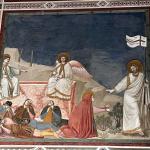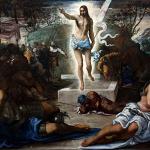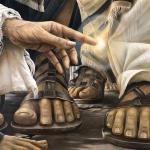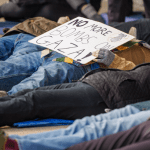I’m in Hong Kong with the Henry Center, my employer, as we’re hosting an international conference on evangelical identity. I’m blogging about the conference on the Henry Center blog and will cross-post here.
Day Four in Hong Kong, and we are right in the thick of our conference. It is going quite nicely. Last night, we held a session at an Evangelical Free church that meets in a shopping mall in the city, Tsim Fook church. Well over 200 people turned out to hear Drs. Tremper Longman and David Pao consider the topic of holy war.
Longman’s presentation was entitled “Holy War” and the Universal God: Reading the Old Testament Holy War Texts in a Biblical-Theological and Post-Colonial Setting”. I have certainly heard of Tremper Longman, and I have used his commentaries, but I always find that my understanding of an author is altogether altered after I meet them in person or hear them speak in public. Longman’s talk exemplified the best of evangelical scholarship as it traced the idea of holy war through the canon. It brimmed with passion, pulsed with theological insight, and made a clear and indelible mark on its hearers. I would heartily commend Longman’s works to readers. He clearly has a passion to help the church know its Bible. After his talk, which was given through an interpreter, David Pao of TEDS spoke. Pao considered the idea of holy war in the New Testament and noted that when obeying the Lord, Christians are actually engaging in spiritual warfare of the kind discussed in Ephesians 6. He noted that such action was fundamentally subversive to the spiritual powers of darkness and marched through the NT material with vigor and wisdom. It has been enjoyable to see Dr. Pao in his home territory. He is a hugely respected figure here, and his presentation demonstrated why.
This morning, Drs. Tite Tienou of TEDS, Paul Lai of CES, and Carver Yu of CGST covered theological education. Each of the presentations by these key administrators raised valuable questions on this topic, and each provided interesting guidance for the Christian academy in the days ahead. Theological contextualization was a common focus, as was missional theologizing. Oxford-educated Carver Yu’s talk, “Forging Evangelical Identity: Integration of Models of Theological Education in the Global Context”, gave an excellent survey of the market forces that imperil Christian witness. Yu challenged the audience to adapt a theological model of education in which theology, according to theologian Karl Barth, critiques the preaching and witness of the church. As can be expected, the lecture was challenging and provocative.
The morning session prompted thought on my part about the nature of theological education. In general, the academy was assumed as a necessary presence in all of the lectures. It is interesting, though, that the New Testament, while recognizing and ennobling the office of teachers, nowhere posits the need for an academy. By mentioning this I do not wish to be read as casting aspersions on the academy. Indeed, I am at TEDS as a PhD student, and earning my bread by working for the Henry Center at TEDS. With that said, it does seem to me that there is helpful ground to be covered on the topic of church-based theological education. How can the church and the academy better work together such that professionalization and insufficient preparation are together overcome? Going too far one way at this point in the church’s history seems to me to deprive us either of ministerial depth or ecclesial connection. I hope that in future days we can think more about this matter.
We have just one more day to go in Hong Kong (one full day, that is). The week has been intensive but profitable. I had hopes of playing the greatest game in the world (basketball, for those who didn’t immediately know) with some people from the city, but it seems that time is short and this wish may go ungranted. This is inconsequential, though, because we are having such a rich time interacting with fellow Christians, learning from them, and fellowshipping together that the days are passing quickly and enjoyably.
What a privilege it has been to be with believers of other lands in a foreign place. I am thankful for the Henry Center and its supporters. One can write sparkling copy about the importance of theological partnership, and that’s one thing. But when one experiences it, one finds that the copy, however polished, speaks truly. The reality of united Christianity sinks in, and the heart yearns even more for a day when division and distance are overcome, and the body of Christ is freed to worship its Lord and Savior together in the splendor of holiness.















